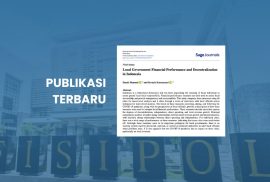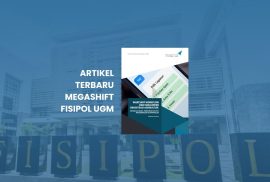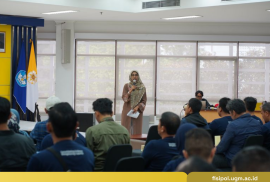Yogyakarta, 2 October 2025–The Faculty of Social and Political Sciences, Universitas Gadjah Mada (FISIPOL UGM) held a workshop entitled “Contesting Hegemony: Labor, Ideology, and the Limits of Resistance in Post-Authoritarian Indonesia” in the FISIPOL UGM’s 4th floor auditorium. The event featured four speakers: Vedi Hadiz (University of Melbourne), Hari Nugroho (Universitas Indonesia), Diatyaka Yasih (Universitas Indonesia), and Muhtar Habibi (Universitas Gadjah Mada). The discussion explored how power, ideology, and the working class interact in Indonesia’s post-New Order political and economic system, as well as the extent to which community survival strategies can develop into forms of resistance against hegemonic domination.
SDGs 8: Decent Work and Economic Growth
Yogyakarta, September 25, 2025—The Center for Digital Society (CfDS) of Universitas Gadjah Mada collaborated with the University of Oxford and Worker Exchange in organizing Difusion #127 titled “Algorithms at the Wheel: Global Perspectives on Ride-Hailing Work”. This discussion brought together Reuben Binns (University of Oxford), James Farrar (Worker Exchange), Ayom Mratita Purbandani (CfDS UGM), as well as Suci Lestari Yuana (Universitas Gadjah Mada).
This public forum highlighted how the algorithm manages and controls the workload of ride-hailing gig workers globally. This forum delved upon whether or not the artificial intelligence based-system can actually produce efficiency, or make gig workers more vulnerable. Through a research report titled “Precarity by Design: AI, Labor Discipline, and the Welfare of Ride-hailing Drivers in Jakarta and Gunungkidul”, researchers at CfDS found out that the aspects of opacity in the systems of AI is not just a mere coincidence, but a calculated approach in supporting the interest of the platform. This algorithm works by exploiting the flexibility of gig workers, where drivers need to work in order to be visible in the system.
The Soenario Kolopaking Team from the Department of Sociology, Faculty of Social and Political Sciences (FISIPOL), Universitas Gadjah Mada (UGM) has won first place in the National Student Scientific Article Competition at the Sociology Competition of Unesa (SOCIUS) 2025, organized by Universitas Negeri Surabaya (UNESA). The competition ran from June 10 to August 3, 2025, and was participated in by eight universities from across Indonesia.
The Soenario Kolopaking Team consists of Nurima Setianingrum and Afkaar Nabil Falah. Under the guidance of Gregorius Ragil Wibawanto, M.A., the team successfully presented their scientific paper titled “The Public Between the State and the Market: The Struggle of Female Online Ojek Drivers in Layered and Persistent Vulnerability.”
Yogyakarta, 9 September 2025 – The Center for Digital Society (CfDS) at the Faculty of Social and Political Sciences (FISIPOL) Universitas Gadjah Mada celebrated its tenth anniversary under the theme “A New Era to Rethink Digital.” The celebration also marked the launch of the 2025 Digital Intelligence Course (MKKD), which carries the topic “Building a Human-Centered and Inclusive Digital Ecosystem.”
Since its establishment ten years ago, CfDS has consistently empowered communities through research and advocacy in digital transformation. One of its flagship initiatives is MKKD, a free digital literacy class initiated in collaboration with the Ministry of Communication and Digital Affairs (Komdigi) in 2020. To date, MKKD has reached more than 40,000 participants and features instructors from across sectors, including academia, government, and industry.
Bevaola Kusumasari, Ph.D., a lecturer from the Department of Management and Public Policy (DMKP), Faculty of Social and Political Sciences (FISIPOL) UGM, has once again demonstrated her contribution to the international academic arena. She recently published a scholarly article entitled “Local Government Financial Performance and Decentralization in Indonesia.”
This publication examines the financial performance of local governments in the context of decentralization in Indonesia. Drawing on data analysis from 66 cities and in-depth interviews in 4 cities, the study highlights how financial performance measures—such as degrees of decentralization, independence, direct spending, and local revenue growth—are used to evaluate local financial governance.
Two lecturers from the Faculty of Social and Political Sciences (FISIPOL), Universitas Gadjah Mada, Massageng Widagdhaprasana and Hempri Suyatna, joined as speakers at the online Townhall Muda Yogyakarta forum under the theme “Youth Entrepreneurship Innovation.” On this occasion, both highlighted opportunities, challenges, and innovations in developing a sustainable social entrepreneurship ecosystem.
Director of the Creative Hub (C-Hub) FISIPOL UGM, Massageng Widagdhaprasana, emphasized that FISIPOL’s role through C-Hub is not merely as an incubator but also as a catalyst in building a youth entrepreneurship ecosystem. “We aim to establish a transdisciplinary learning ecosystem that generates new values in social entrepreneurship. Young people must be encouraged to adapt through various cross-sector collaborations,” he explained.
New Release: Megashift FISIPOL UGM Article
“Digital Orchestration for Indonesian Agriculture: From WhatsApp Workflow to Food Security”
By: Setiawan Guntoro
Megashift FISIPOL UGM has once again published an article that sparks discussion on the future of agriculture and food security in Indonesia. This piece highlights a simple yet revolutionary idea: how an everyday app like WhatsApp can become the backbone of agricultural digitalization.
The article sheds light on a long-standing issue in agriculture, particularly in broiler farming: the slow flow of field data from farms to management, which often leads to delayed and risky decision-making. Many agritech startups have failed because their applications did not match farmers’ habits. However, WhatsApp—used by 9 out of 10 Indonesians—emerges as an alternative solution.
Yogyakarta, September 3, 2025—As countries around the world navigate the challenge of fostering growth and addressing climate change, the governance of the mining sector will have profound implications for environmental sustainability, economic growth, and social justice. Addressing this issue, the Faculty of Social and Political Sciences (FISIPOL) of Gadjah Mada University (UGM), sponsored by the Academy of Medical Sciences, together with the University of Essex, as well as leading universities and institutes in Australia, South Africa, Kenya, and Europe, collaboratively hosted a networking conference titled “Climate Geopolitics and Sustainable Mining Governance” on September 3-4, 2025.
Yogyakarta, August 28, 2025—The Faculty of Social and Political Sciences (FISIPOL) Universitas Gadjah Mada (UGM) welcomed a group of participants from the Training on the Preparation of Strategic Plans (Renstra) for Regional Government Agencies of Bogor Regency. The program, facilitated by the Center for Capacity Development and Cooperation (PPKK) FISIPOL UGM, was designed as a campus tour and took place on Thursday morning (28/8).
The visit began with explorations to several faculties at UGM, including the Faculty of Forestry and the Faculty of Law, before concluding at the Faculty of Social and Political Sciences (FISIPOL). At FISIPOL UGM, the participants were welcomed by the Executive Secretary of PPKK, Dr. Pradhikna Yunik, followed by a presentation from Dr. Maharani Hapsari titled “Building Regional Competitiveness: Mapping Economic Potential and Innovation Based on Science and Technology.”
Yogyakarta, August 27, 2025 – The Faculty of Social and Political Sciences, Universitas Gadjah Mada (FISIPOL UGM), today graduated 216 undergraduate students during the 4th Graduation Period of the 2024/2025 Academic Year.
The graduates came from six departments, as follows:
-
International Relations (57 graduates)
-
Communication Science (65 graduates)
-
Public Policy and Management (28 graduates)
-
Social Development and Welfare (31 graduates)
-
Politics and Government (19 graduates)
-
Sociology (16 graduates)
For this period, Hanung Abdul Muqqit Ramadhan Anwar from the Department of Communication Science was named the Faculty’s Best Graduate with a GPA of 3.97 and a study duration of 3 years, 7 months, and 25 days.









